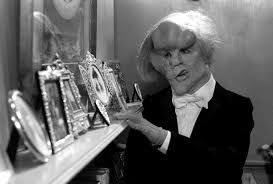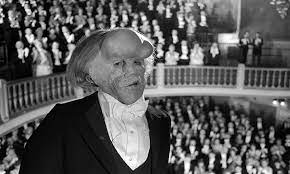The Elephant Man (1980)

Review: The Elephant Man (1980)
A Haunting Portrait of Humanity and Compassion
Directed by David Lynch, The Elephant Man (1980) tells the harrowing yet profoundly moving true story of Joseph Merrick (referred to as John Merrick in the film), a man born with severe physical deformities who struggles for dignity in a society that sees him as a sideshow attraction. Featuring powerhouse performances from John Hurt and Anthony Hopkins, this historical drama explores themes of humanity, cruelty, and acceptance with a restrained yet deeply emotional approach.
Plot Overview
Set in 19th-century Victorian England, the film opens with Dr. Frederick Treves (Anthony Hopkins), a compassionate surgeon, discovering John Merrick (John Hurt) in a freak show. Merrick, brutally exploited by his manager Bytes (Freddie Jones), endures a life of public humiliation and physical abuse.
Moved by Merrick’s plight, Treves brings him to the London Hospital, where he begins to uncover Merrick’s humanity and intelligence, challenging society’s perception of him as a monstrous curiosity. As Merrick gains acceptance among London’s upper class, the film poignantly examines the tension between genuine compassion and the lingering spectacle of his condition.
The Good: A Masterpiece of Emotion and Craftsmanship
1. John Hurt’s Heartbreaking Performance:
Hurt’s portrayal of Merrick is a masterclass in acting. Beneath heavy prosthetics, Hurt conveys Merrick’s vulnerability, dignity, and humanity through his voice and subtle physicality. His performance is both heart-wrenching and inspiring, capturing the essence of a man whose spirit transcends his physical suffering.
2. Anthony Hopkins’ Subtle Brilliance:
As Dr. Treves, Hopkins delivers a nuanced performance that explores the moral complexities of his character. Treves’ initial motivations for helping Merrick are tinged with self-interest, but as their bond deepens, he becomes a true advocate for Merrick’s dignity and humanity.
3. David Lynch’s Direction:
Known for his surreal and unsettling films, Lynch takes a restrained approach in The Elephant Man, crafting a visually striking yet emotionally grounded narrative. The film’s black-and-white cinematography enhances its period setting and lends a timeless, almost dreamlike quality to the story.
4. Cinematography and Production Design:
Freddie Francis’ cinematography is stunning, capturing the grimy, industrial atmosphere of Victorian London with haunting beauty. The film’s visual style emphasizes the stark contrast between the harsh realities of Merrick’s world and the moments of compassion he experiences.
5. Themes of Humanity and Acceptance:
At its core, The Elephant Man is a meditation on what it means to be human. It challenges audiences to confront their prejudices and consider the impact of kindness and understanding in the face of cruelty.
6. The Emotional Impact:
Few films leave a lasting emotional impression quite like The Elephant Man. Merrick’s journey from humiliation to dignity is both tragic and uplifting, culminating in a tearful yet hopeful conclusion that resonates long after the credits roll.
The Weaknesses: Minor Quibbles
1. Slow Pacing:
The film’s deliberate pacing may feel sluggish to some viewers, particularly in its quieter moments. However, this measured approach allows for a deeper exploration of character and theme.
2. Simplistic Supporting Characters:
While the central characters are richly developed, some of the supporting cast—such as the antagonistic Bytes—come across as one-dimensional. This may have been a deliberate choice to focus the narrative on Merrick and Treves, but it slightly diminishes the complexity of the story’s moral landscape.
Themes and Symbolism
The film delves deeply into themes of:
- Human Dignity: Merrick’s struggle for recognition as a human being reflects the universal desire for respect and acceptance.
- Compassion vs. Exploitation: Treves and society’s treatment of Merrick raises questions about the fine line between altruism and voyeurism.
- The Nature of Beauty: The film challenges conventional notions of beauty, suggesting that true humanity lies beyond physical appearance.

Standout Moments
- “I Am Not an Animal!”
Merrick’s defiant proclamation during a moment of public humiliation is one of cinema’s most iconic and heart-wrenching scenes. It encapsulates the film’s core message about dignity and humanity. - Merrick’s Cathedral Model:
Merrick’s construction of a model cathedral symbolizes his inner world and his desire for beauty and creation, contrasting with the deformity that defines him in others’ eyes. - The Final Scene:
The film’s closing moments, featuring Merrick’s peaceful acceptance of his fate, are both tragic and profoundly moving, offering a sense of closure and transcendence.
Final Thoughts
The Elephant Man (1980) is a powerful, unforgettable film that masterfully combines historical drama with timeless themes of compassion and humanity. With outstanding performances, exquisite direction, and a deeply emotional narrative, it remains a cinematic masterpiece that continues to resonate with audiences.
David Lynch’s restrained approach, coupled with John Hurt’s transformative performance, ensures that The Elephant Man is not only a tribute to Joseph Merrick but also a poignant exploration of what it means to be human.
Rating: 9.5/10
The Elephant Man is an enduring classic—a film that challenges, moves, and ultimately uplifts through its exploration of kindness and the human spirit.










